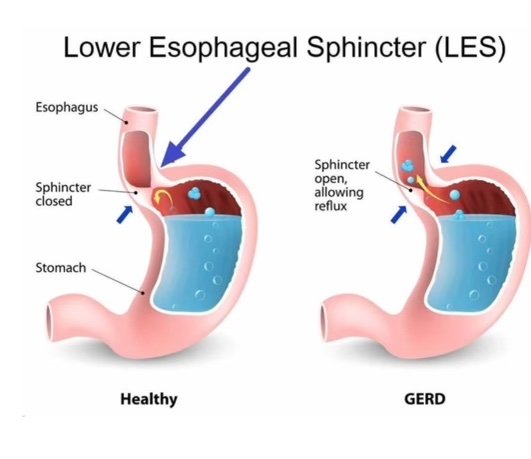Reflux: Causes, Symptoms, and Natural Methods to Normalize Stomach Acidity
Gastroesophageal reflux disease (GERD), commonly known as reflux, is a condition in which the contents of the stomach, including acid, flow back into the esophagus, causing unpleasant symptoms such as heartburn and a sour taste in the mouth. Many people believe that reflux is caused by excess stomach acid, but the problem is actually due to low stomach acid levels. Misunderstanding this issue can lead to incorrect treatment and long-term negative health consequences. In this article, we will explore the main causes and symptoms of reflux, the potential dangers of prolonged use of acid-reducing medications, and natural methods to normalize stomach acidity levels.
Symptoms of Reflux
Reflux can manifest through a variety of symptoms that range in severity and timing:
1. Heartburn : A burning sensation behind the breastbone, often occurring after meals or when lying down.
2. Sour Taste in the Mouth : Caused by stomach acid entering the mouth, especially after eating or during sleep.
3. Regurgitation :A sour or bitter taste during belching caused by the backflow of stomach contents.
4. Difficulty Swallowing (Dysphagia): This can be caused by damage to the esophagus from stomach acid.
5. Chronic Cough or Hoarseness : Irritation of the larynx and airways by acid can cause these symptoms.
6. Chest Pain : Intense pain can mimic a heart attack, requiring careful diagnosis.
Causes of Reflux
Reflux can occur due to various reasons related to digestive system dysfunction:
1. Weakness of the Lower Esophageal Sphincter (LES): This is the main factor that allows stomach contents to flow back into the esophagus. LES weakness can be caused by increased intra-abdominal pressure, obesity, or pregnancy.
2. Low Stomach Acidity (Hypochlorhydria) : Contrary to common belief, low stomach acidity cause the LES not to close properly. This allows stomach contents, even if they are not highly acidic, to enter the esophagus and cause reflux symptoms.
3. Overeating and Poor Diet : Consumption of fatty, spicy, acidic foods, caffeine, alcohol, and chocolate can contribute to reflux.
4. Stress : Chronic stress and anxiety can weaken the function of the LES and reduce stomach acid production.
5. Certain Medications : Antidepressants, sedatives, and non-steroidal anti-inflammatory drugs (NSAIDs) contribute to reflux.
Dangers of Long-Term Use of Acid-Reducing Medications
Many patients experiencing reflux symptoms turn to proton pump inhibitors (PPIs) or antacids, believing their symptoms are caused by excess acid. However, this can exacerbate the problem and cause numerous side effects:
1. Impaired Digestion and Nutrient Absorption : Stomach acid is necessary for breaking down proteins and absorbing nutrients such as vitamin B12, iron, calcium, and magnesium. Long-term reduction of acidity can lead to deficiencies in these nutrients.
2. Increased Risk of Infections : Stomach acid acts as a barrier against pathogens( viruses, bacterias, parasites) entering with food. Lowering acid levels increases the risk of gastrointestinal infections, such as Clostridium difficile.
3. Development of Osteoporosis and Increased Risk of Fractures : Calcium and magnesium deficiencies caused by prolonged use of PPIs can lead to weakened bones and an increased risk of fractures, especially in older adults.
4. Disruption of Gut Microbiota : Reduced acidity can alter the composition of the microbiome, affecting the immune system and metabolism.
Natural Methods to Normalize Stomach Acidity
For safe and effective treatment of reflux, especially in cases of hypochlorhydria (low acidity), there are natural methods that can help restore the balance of stomach acidity.
1. Apple Cider Vinegar and Lemon Juice : Diluted apple cider vinegar or lemon juice taken before meals can help stimulate the production of gastric juice and improve digestion.
2. Bitter Herbs and Infusions : Bitters like dandelion root, artichoke, and licorice root stimulate the production of stomach acid and improve bile flow, promoting more complete digestion.
3. Digestive Enzymes and Betaine HCl : These supplements help the body break down food and improve nutrient absorption, which can reduce reflux symptoms.
4. Probiotics : Taking probiotics helps restore gut microbiota, which promotes better digestion and strengthens the immune system.
5. Stress Management : Stress-reducing practices such as yoga, meditation, and breathing exercises can improve gastrointestinal function and reduce reflux symptoms.
Conclusion
Reflux can occur with both high and low stomach acidity, and it is important to recognize the true cause of symptoms to choose the correct approach to treatment. Prolonged use of acid-reducing medications can worsen the condition and lead to nutrient deficiencies and other problems. Utilizing natural methods such as dietary changes, the use of bitter herbs, stress management, and probiotics can help safely and effectively normalize stomach acidity and improve overall health.
